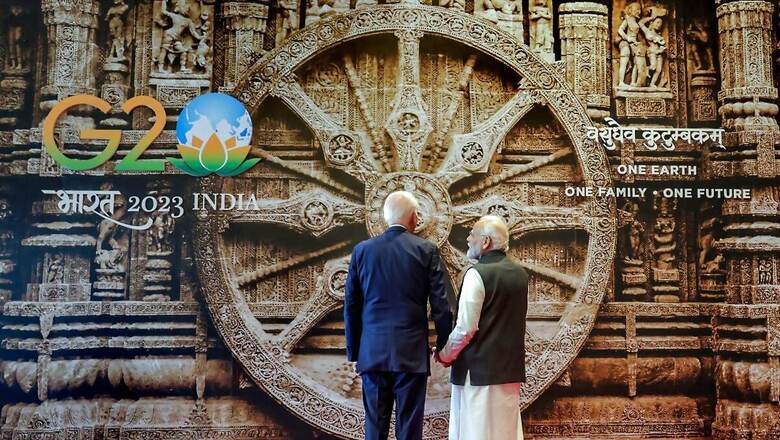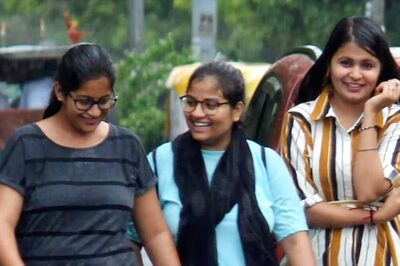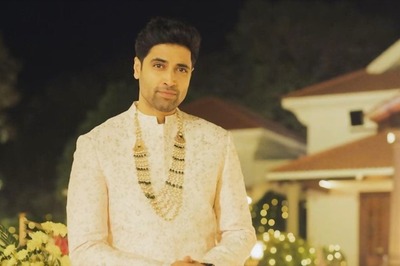
views
In 2023, India held the presidency of the G20, a global forum of the world’s largest economies. Today, it celebrates a year since it hosted the G20 summit in New Delhi. While the summit took place amid political turbulence and geopolitical rivalries, India stayed true to its ancient philosophy of Vasudhaiva Kutumbakam—”the world is one family.”
This wasn’t just a slogan. It was a guiding principle for how India approached its presidency, aiming for inclusive growth, sustainable development, and global cooperation. Through initiatives like the India-Middle East-Europe Economic Corridor (IMEC), the inclusion of the African Union, and sharing its innovative India Stack technologies, India showed how this ancient wisdom drives its conscience.
Theme Rooted in Ancient Wisdom
India’s G20 theme ‘One Earth, One Family, One Future’, directly drew inspiration from the Sanskrit adage Vasudhaiva Kutumbakam, taken from the Maha Upanishad. This philosophy reflects a universal view, emphasising that the world is interconnected, and everyone is part of one global family. Prime Minister Narendra Modi consistently referenced this belief in shaping the G20’s discussions, ensuring that collaboration, equality, and shared responsibility were at the heart of every conversation.
People’s Presidency: 220 Meetings in 60 Cities
Unlike previous summits, India’s G20 presidency was more than just a gathering of world leaders. India brought the event to the people. With 220 meetings across 60 cities, citizens from every corner of the country—from Kashmir to Kerala—became part of this grand diplomatic endeavour. India’s G20 wasn’t a high-flying leaders’ affair; it became an event that touched the grassroots, making it a people’s presidency in the truest sense.
Giving Voice to the Global South
Throughout its presidency, India made sure that the voice of the Global South, which often goes unheard at global forums, was amplified. India organised the Voice of the Global South Summit early in 2023, where developing nations could express their concerns and hopes. India’s diplomatic efforts culminated in the inclusion of the African Union (AU) as a permanent member of the G20—a historic moment that truly reflected Vasudhaiva Kutumbakam. It was a powerful acknowledgement that emerging economies deserve equal representation at the global table and should not be left behind.
The New Delhi Leaders’ Declaration: Diplomatic Masterclass
One of the most remarkable outcomes was the adoption of the New Delhi Leaders’ Declaration. With the Ukraine war creating a deep divide among G20 members, a consensus seemed almost impossible. Western leaders pushed for a strong condemnation of Russia, while others resisted. Yet, India brokered a delicate compromise, drafting a declaration that avoided a direct reference to Russia but emphasised peace, stability, and humanitarian needs. It was a diplomatic masterclass that showcased India’s ability to bridge differences for the greater good.
Sustainable Development at the Core
India’s focus on Vasudhaiva Kutumbakam was not just symbolic—it was action-oriented. One of India’s key priorities was sustainable development, which was reflected in its G20 agenda. From advocating climate financing to accelerating inclusive growth, India pushed for a global commitment toward greener, more equitable development models. The launch of the Global Biofuel Alliance during the summit was one such step toward promoting cleaner energy sources. It demonstrated India’s leadership in championing sustainability and signalling that economic progress does not have to come at the cost of our planet.
Sharing India Stack with the World
Another way India embodied the spirit of Vasudhaiva Kutumbakam was by sharing its innovations in digital public infrastructure with the world. The India Stack, a collection of technologies like Aadhaar, UPI (Unified Payments Interface), and DigiLocker, was showcased to G20 leaders as an example of how technology can drive inclusive development. In the last decade, India went through transformative changes in the realm of digitisation. This includes Aadhaar, a biometric identification system covering all Indians; UPI or the Unified Payments Interface, which is a homegrown technology allowing instant digital payment facilities enabling interbank, peer-to-peer, and person-to-merchant transactions via simply a mobile app. Today, Indians can walk into any shop, big or small, scan a QR code with their phone, make a payment in seconds and move on. At the G20 summit, this tech was demonstrated to over 1000 foreign delegates.
Another one is DigiLocker, which carries all of a person’s authentic and verified documents in a digital format. Many more such digital platforms have made life easy. They have also made governance easy and efficient, helping to drive inclusive development and financial inclusion. The India Stack shows how technology, pioneered in India, can be scaled for the global good.
Reforming Multilateral Institutions
India’s presidency also saw a push for reform in global multilateral institutions, particularly development banks like the World Bank and the International Monetary Fund (IMF). India’s vision was clear: these institutions must be restructured to better serve the needs of developing countries, providing them with the resources and support required to achieve sustainable growth. This push for reform was deeply rooted in the philosophy of Vasudhaiva Kutumbakam, as it sought to create a more equitable financial system for the benefit of all nations.
IMEC Launch: A Modern Silk Road
One of the most significant achievements of India’s G20 presidency was the launch of the India-Middle East-Europe Economic Corridor (IMEC). This new proposed trade route, likened to a modern Silk Road, will link India with the Middle East and Europe through a network of rail and shipping lanes. With the participation of countries like the US, India, Saudi Arabia, the UAE, Israel, and the European Union, IMEC is poised to be a transformative project. Prime Minister Modi emphasised that the corridor would not only enhance economic ties but also promote connectivity and cooperation in a way that reflects the spirit of Vasudhaiva Kutumbakam.
Championing Equality and Equity in Global Governance
From day one of its presidency, India demonstrated a keen desire to reshape global governance on principles of equality and equity. This is where Vasudhaiva Kutumbakam played a crucial role. India consistently advocated for the inclusion of marginalised voices, promoting reforms in multilateral institutions and calling for a fairer global order. This vision was not just about economic cooperation but also about giving every nation—regardless of size or economic power—a seat at the decision-making table.
Women-Led Development and Inclusive Growth
Women-led development was the central focus of India’s G20 agenda. The idea was simple but powerful: achieving gender equality is key to sustainable growth. By promoting initiatives that supported women’s participation in the workforce and leadership, India demonstrated how inclusive growth, inspired by the Vasudhaiva Kutumbakam principle, can benefit everyone. Gender inclusivity was highlighted as essential to a more balanced, prosperous future.
India’s G20 presidency was more than a diplomatic success; it was a manifestation of Vasudhaiva Kutumbakam in action. Under PM Modi’s leadership, India demonstrated to the world that cooperation, inclusion, and equity are the only paths to a prosperous and sustainable future. In doing so, India reminded the world that, truly, “we are one family.”
Views expressed in the above piece are personal and solely that of the author. They do not necessarily reflect News18’s views.




















Comments
0 comment